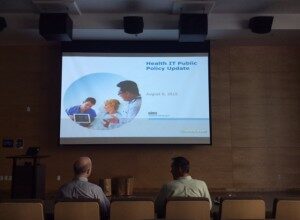Big data, data analytics, and population health management are hot topics in health IT. Actually, big data and data analytics are buzz words in every industry, but population health management is one of the many end goals individuals hope will result from the combination of electronic patient care data and analytics, paving the way for needed advancements in care for chronic diseases such as diabetes and hypertension, among others.
Big data, data analytics, and population health management are hot topics in health IT. Actually, big data and data analytics are buzz words in every industry, but population health management is one of the many end goals individuals hope will result from the combination of electronic patient care data and analytics, paving the way for needed advancements in care for chronic diseases such as diabetes and hypertension, among others.
In itself, the term “big data” means nothing. How can data be big? A lot of data can require additional servers, but data in itself can’t be big. Big atoms, anyone? Here’s what we’re talking about, according to Wikipedia: “Big data is the term for a collection of data sets so large and complex that it becomes difficult to process using on-hand database management tools or traditional data processing applications.”
What could be a more meaningful use of electronic health records than using available patient data to predict when a spike of heart attacks may occur in a given region of the country? Or, any other combination you can dream up? I turned to Ryan Brush, senior director, distinguished engineer at Cerner Corp. to answer some of my questions surrounding the topic. Ryan is in charge of Cerner’s big data development.
1. Everyone likes to talk about “the promise of big data” in health care. As someone who specializes in this endeavor at Cerner, is the availability of more data going to positively disrupt the way healthcare is provided or is it more likely to complement how care is provided?

- Ryan Brush, Senior Director, Distinguished Engineer at Cerner Corp.
Large data sets will impact the industry to the extent that analyzing them will allow us to answer questions that were previously unanswerable. This sort of thing tends to start on the edges and then work its way through the entire industry. We might start by identifying major risk points or expenditures across a population of people, say people with diabetes, allowing for better input on policy or care management decisions. From there we can share context helpful to providers, expanding this over time.
There is a lot of excitement around big data, but it’s really a means to a bigger end. It’s a tool for researchers and administrators and clinicians to answer important questions using a more complete picture of health care than has ever existed — and then apply those answers to improve care and control costs. The real excitement isn’t about big data, it’s about the innovation it can support.
2. A health record contains a lot of information. What are the biggest challenges in parsing, tagging, and coding the segments of the data, and then providing useful correlations? How have you found success?
Most data scientists will tell you that the bulk of their time is spent making data clean and consistent. Once that’s in place, the biggest challenge is feature extraction, the identification of useful indicators in data that can be fed into a number of analytic algorithms. Unfortunately, health care is no exception to these needs, and the complexity of the data makes this even more challenging.
The good news is we have had success working through these, as we develop better techniques to help humans make sense of this data. Improving approaches for sharing health data will also help on this, reducing friction and variance between systems.
3. Let’s talk mathematics and statistics. Chronic conditions are often cited as areas where big data has the most promise. What kind of work is done using statistics to eliminate or reduce common human errors that arise from heuristics (e.g., educated guesses) and biases (e.g., small sample sizes)?
This is exactly the sort of question we can start answering more effectively through big data analysis. Scientific rigor is being applied to more and more of health care in the form of evidence-based medicine, but we still have a long way to go. As Peter Norvig famously pointed out in The Unreasonable Effectiveness of Data, even relatively simple algorithms over large data sets can be effective. In other words, we have a lot more evidence to support evidence-based medicine.
However, we should add a note of caution. These data sets are unprecedented and it can be easy to draw incorrect conclusions. For instance, Doug McNair, the president of Cerner Math, has pointed out that conventional assumptions around data distribution may not hold true — and this requires more sophisticated non-parametric analysis. Ultimately I expect to see a combination of deep expertise to make sense of this data, enabling the application of simpler models with confidence when they fit.
4. All the data in the world is only useful if it is available at the point of care. What kind of information do you think caregivers will gladly accept and use in the exam room?
We need to work with clinicians to make sure they have the right context that helps them do their jobs as effectively as possible — and make sure we don’t overwhelm them with data irrelevant to their needs. I expect this to largely be a function of the context, the venue and condition of the point of care itself. Our goal is to create a system that makes all things possible, to create the most complete representation of health, and to have an architecture that supports getting it to the point of care. From there we work with clinicians to align that with their needs.
5. In five years, what do you hope to see accomplished with health data?
The next five years need to see the rise of platforms for securely bringing data together data, understanding it, and applying that understanding to improve care. We should see some real success using that platform. It will start at the macro level, such as support for policy decisions, but increasingly drive appropriate context and evidence to the point of care. An example of that impact is the work we’re doing around population health management with Advocate Health Care in Chicago, including readmission prediction and prevention. Such successes show we can deploy this into other population settings and make a difference there, too. There won’t be a big bang where everything lands at once, but we will see these platforms increasingly impact a number of areas.
Special thanks to Greg Meyer at Cerner for introducing me to Ryan Brush and making this Q&A possible.









